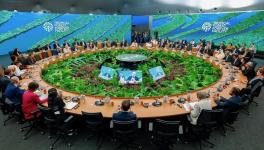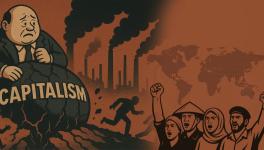Renewed North-South Face-off in Climate Negotiations
The climate negotiations at Copenhangen appear to have set the trend for future climate talks in more senses than one. One is of course very much aware of the Copenhagen Accord, the product of a last-minute face-off between the United States and the major developing countries at the highest political level. We are also aware that despite its not being an official UNFCCC resolution, the text of the Copenhagen accord nevertheless casts a shadow over the future of climate negotiations. It is clear that the Copenhagen Accord is now the reference point for the developed nations and that they will continue to push forward from this point to their final goal of passing as much of the burden of mitigation as possible onto the developing world.
But the recently concluded round of negotiations at Bonn demonstrated that Copenhagen has also set the benchmark in terms of the use of strong-arm tactics and assorted dubious strategems in the negotiations. The highlight of the latest round at Bonn was the attempt to pull off a negotiating ``coup'' in the Adhoc Working Group on Long-term Cooperative Action at its final plenary. Developing nations were in for a rude suprise when a fresh draft negotiating text of the AWG-LCA was presented by the Chair, Ms. Margaret Mukhanana-Sangarwe of Zimbabwe, on the penultimate day of the meeting. Sweeping aside the views of the developing countries on a number of critical and contested issues, the text attempted to swing the negotiations decisively in favour of the developed nations. Bracketed text , (that in the jargon of international negotiations denotes areas of disagreement in the text, which are then typically placed within square brackets ) vanished across major sections of the document, to be replaced with wording that appeared to come straight out of versions of the infamous ``Danish text'' that had bedeviled the negotiations in Copenhagen.
In one striking instance, going well beyond the language of the Copenhagen Accord, the unbracketed text read: ``Parties should cooperate in the peaking of global and national emissions by 2020.'' suggesting that developing countries were amenable to the peaking of their emissions around 2020, when in fact no such agreement had even been hinted at by them. Unbracketed text farther on called for the mitigation actions of the developing countries to deliver ``in aggregate a substantial deviations in emissions from business-as-usual emissions by 2020'', again an unwarranted interpolation. In marked contrast, when referring to the mitigation action of the developed nations, the draft, while calling for the reduction of ``the aggregate greenhouse gas emissions of developed country Parties by 25-40%'' by 2020, left unspecified the reference year with respect to which emissions reductions were to be measured. It may be recalled that it has been a favourite stalling tactic of the developed nations to quote emission reduction figures without specifying the base year with respect to which these reductions were to be measured
On the final day, in a reversal of roles from the pre-Copenhagen days, it was Russia, initially with Japan's support, that held up the plenary session of the Ad hoc Working Group on the Kyoto Protocol (AWG-KP). While Japan had been demanding the linking of the work of the AWG-KP with that of the Ad hoc Working Group on Long-Term Cooperative Action (AWG-LCA) including mitigation commitments by the developing countries, Russia shockingly objected to even the term "enhanced" in describing the future commitments of the developed countries. This was clearly a renewed brute attack on the Kyoto Protocol.
Apart from these moves, the United States had earlier resumed its one-sided insistence on ``transparency'' in the mitigation actions of the developed nations. In its intervention on the issue of monitoring, reporting and verification (MRV) of developing nation actions, the US made clear in extraordinarily strong language that ``nothing'' would happen on any other issue unless an appropriate regime of MRV for developing countries' actions were in place. The intervention sought to undermine the compromise made in the Copenhagen Accord by pushing for a further detailing of the content of the term ``international consultations'' with reference to the Nationally Appropriate Mitigation Actions (NAMAs) of the developing nations that were to be voluntarily undertaken without the financial assistance of the developed nations.
The G77 and China were prompt in asserting that the draft negotiating text could not be the basis for further negotiations. The Chair for her part emphasised that the text would be further revised before the next round, but it remains to be seen to what extent the new text would incorporate the viewpoints of the developing nations.
The developed world for their part have also mounted a vigorous criticism of the text, clearly trying to forestall the Chair providing too much leeway to the developing countries in the fresh text.
At the same time, a very pronounced pro-developed nation spin has made its appearance in the global media that have tended to portray the events of the ultimate day as the usual sparring between the North and the South, ignoring the fact that was attempted was in the nature of a negotiating coup.
Two lessons are clear from the events that have transpired at the current round of talks at Bonn. The first is that the developing nations cannot afford to let down their guard against attempts to hijack the negotiations by procedural sleight-of-hand or strong-arm tactics. The second is that the G77 and China have to go beyond a reactive defensive strategy, responding constantly to the challenges of the developed nations. What is needed is a fresh offensive, based of course on the bedrock of climate justice and equity. Undoubtedly, the crux of the matter in global climate negotiations is to get the developed nations to cut their emissions steeply and immediately. However their hand cannot be forced without first winning the battle of ideas in climate policy in the arena of global public opinion.
Get the latest reports & analysis with people's perspective on Protests, movements & deep analytical videos, discussions of the current affairs in your Telegram app. Subscribe to NewsClick's Telegram channel & get Real-Time updates on stories, as they get published on our website.
























